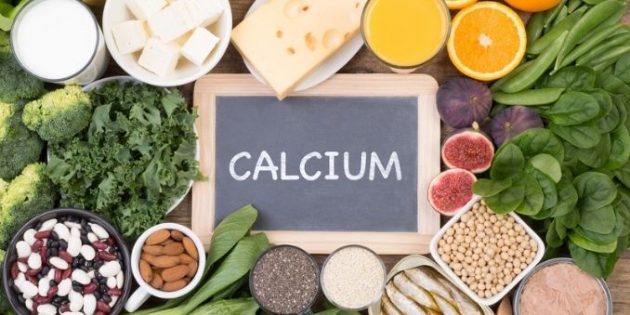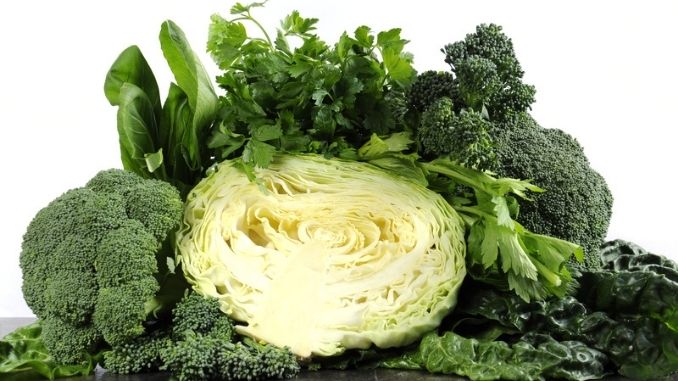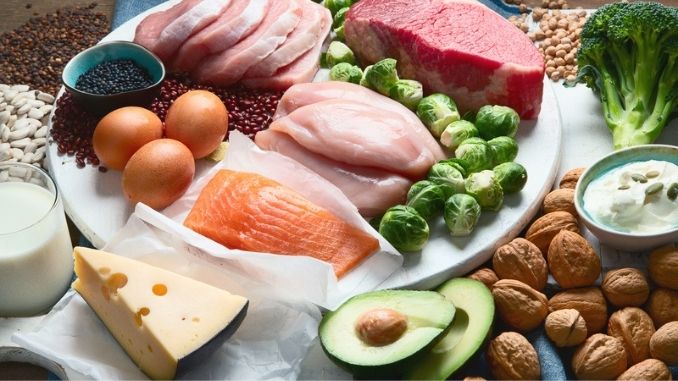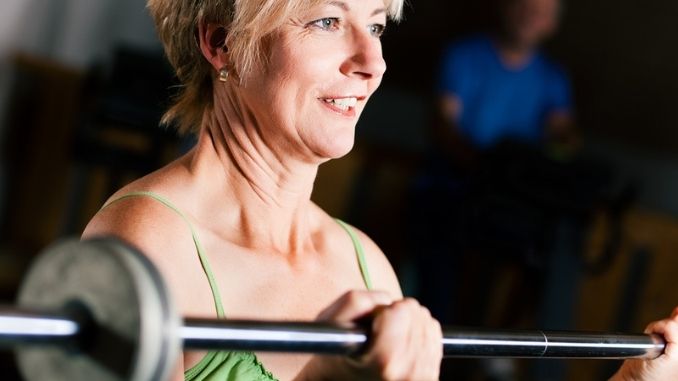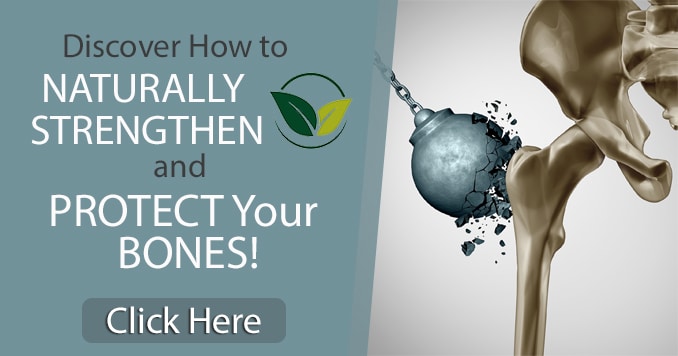Calcium is vital for maintaining strong bones. Calcium is a major building block of your bones, with the skeleton storing 99 percent of your body’s total calcium. The calcium in your bones also acts as a reserve for the calcium needed by your nervous system and muscles. As you age, your body’s ability to absorb calcium decreases, which is why seniors need more calcium than younger adults. You can find large amounts of calcium in milk and dairy products, as well as in green vegetables (broccoli, kale, and bok choy), some fruits (oranges, apricots, and dried figs), canned fish with soft and edible bones (sardines, pilchards, and salmon), nuts (especially almonds) and calcium-set tofu.
Many foods are now fortified with calcium, which means calcium is added to the product. Look for products fortified with calcium, such as bread, cereals, fruit juices, soy beverages, and mineral water. The recommended daily intake for calcium is 1,000 mg per day for most, but teens need more at 1,300 mg, and older women require 1,200 mg. Maintaining adequate calcium levels is essential, but is calcium all you need for strong bones? Read on to find out what else to do to ensure your bones stay strong and healthy.
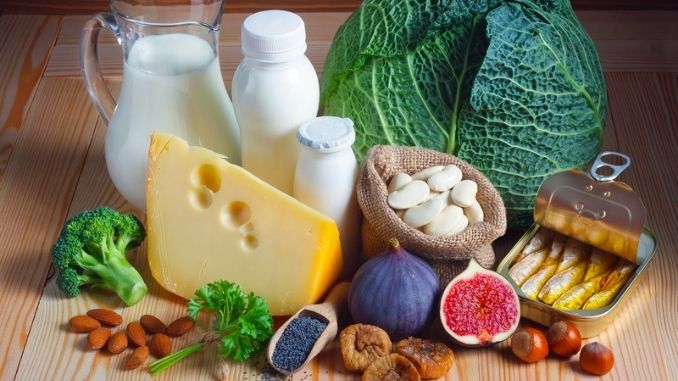
Throughout your life, until about age 30, minerals are incorporated into your bones. By 30 years of age, you have reached your peak bone mass. If strong bones have not been created by this time, you are at an increased risk of developing fragile bones later in life, which could mean more broken and fractured bones. This is why it is important to start building strong and healthy bones as early as possible. There are many nutritional and lifestyle habits that can help not only build strong bones but maintain them as you age. This article will explore the many ways you can build strong bones besides getting enough calcium.
Eat Your Veggies
Vegetables are one of the best sources of vitamin C. Vitamin C stimulates the production of cells that form bone. Vitamin C also acts as an antioxidant, which might help protect bones from oxidative damage. Vegetables may help increase bone density, which is the amount of calcium and other minerals in your bones. Low bone density leads to osteopenia (low bone mass) and osteoporosis (brittle bones). A major risk factor for osteoporosis is increased bone turnover when your bones break down to form new bones. One study demonstrated that women who ate more than nine servings of broccoli, cabbage, parsley, or other plants rich in antioxidants per week showed lower rates of bone turnover. Studies have shown that eating high amounts of green and yellow vegetables has been linked to higher bone mineralization in children and bone mass maintenance in young adults.
Perform Weight-Bearing and Strength Exercises
One of the biggest mistakes people make as they age is focusing on cardio exercise and forgetting about strength training. Your bones are reactive, meaning they rebuild in response to their environment. Your bones will only regrow and get stronger if placed under stress. If they aren’t, your body will not direct resources towards building new bone, and your bones will get fragile and brittle. To keep your bones strong, you must perform weight-bearing or high-impact exercise. These types of exercises are crucial in preventing bone loss in older adults, as well as building bone mass in children. Multiple studies have shown that older adults performing weight-bearing exercises have increased bone mineral density, bone strength and size, and reduced bone turnover and inflammation. Weight-bearing exercises include weight lifting, plyometrics, walking, and running. Cycling and swimming are considered non-weight-bearing exercises.
Eat Enough Protein
About 50 percent of your bone is made of protein. Getting enough protein and balancing this intake with plenty of plant foods and enough calcium is important. Low protein consumption decreases calcium absorption and might affect bone formation and breakdown. Protein is also filling, and increasing your protein intake within recommended levels may promote weight loss and maintenance. Higher protein diets may also preserve bone mass during weight loss. In one longitudinal study of postmenopausal women, higher protein consumption was linked with a lower risk of forearm fractures and a higher bone density in the entire body.
Consume Plenty of Vitamin D & K
Both vitamin D and vitamin K are essential for building strong bones. Vitamin D helps your body absorb calcium, which stimulates the production of new bone. Studies have shown that individuals with low vitamin D levels usually have lower bone density, putting them at a higher risk for bone loss. Vitamin D deficiencies are extremely common, affecting about one billion people worldwide. While some people might be able to get sufficient amounts of vitamin D through sun exposure and food, others may need to supplement. Insufficient vitamin D levels have been linked to many other health concerns, such as chronic fatigue, depression, and high blood pressure. Food sources of vitamin D include fatty fish, liver, and cheese.
Vitamin K2 modifies a protein called osteocalcin, which is involved in bone formation. This modification allows osteocalcin to bind to bone minerals and helps prevent bone calcium loss. Sufficient vitamin K2 supports an increase in bone density. One study in women aged 50-65 demonstrated that those who took a vitamin K2 supplement maintained their bone density. In contrast, those who took a placebo showed a reduction in bone density after 12 months. You can find vitamin K2 in foods such as liver, eggs, meat, and fermented foods like cheese, sauerkraut, and natto. You can also take vitamin K2 supplements.
Maintain a Healthy Weight
Low body weight is the main contributing factor to low bone density and bone loss in postmenopausal women. After menopause, some women lose the protective effects of estrogen, making them more susceptible to bone degeneration. Being underweight also increases your risk of developing osteopenia and osteoporosis. In those that are obese, bone quality can be impaired, and the risk of fractures is increased due to the stress of excess weight. Cycles of losing and gaining weight are also detrimental to bone mass, as periods of weight loss can contribute to bone loss. If possible, maintaining a healthy weight is the best way to protect your bone health.
Calcium is important for strong bones, but many other nutritional and lifestyle habits contribute to healthy bones. Use the tips in this article to help build and maintain strong bones.
Discover how to strengthen and protect your bones naturally. Click here for more info.
